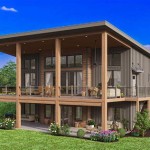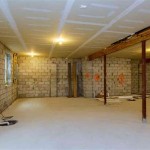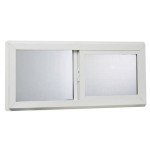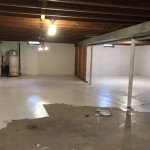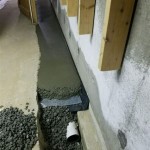Can A Finished Basement Increase Home Value?
The question of whether a finished basement increases home value is a complex one, heavily dependent on a variety of factors. While a finished basement can undoubtedly be a significant asset, translating into a higher selling price, it's not a guaranteed outcome. Market conditions, the quality of the finishing work, the intended use of the space, and the overall design compatibility with the rest of the home all play crucial roles in determining the return on investment (ROI) for such a project.
Homeowners often consider finishing a basement to expand their living space, add recreational areas, or even create a supplemental income stream through rental opportunities. These motivations are valid, but they should be weighed against the potential costs and the ultimate impact on the home's resale value. A poorly executed or ill-conceived basement finishing project can potentially detract from the home's appeal, ultimately reducing its overall value.
To understand the potential for added value, it's crucial to examine the specific elements that contribute to a successful basement finishing project and how they are perceived by prospective buyers. This includes considering the local real estate market and the prevailing preferences of buyers in that area. What features are in demand? What is the typical buyer demographic looking for in a home? These factors can significantly influence the appeal and value of a finished basement.
The Impact of Quality and Functionality
The quality of the finishing work is arguably the most critical factor in determining whether a finished basement will increase home value. A poorly executed finish, with substandard materials or shoddy workmanship, will likely detract from the home's overall appeal. Issues such as uneven flooring, improperly installed drywall, inadequate insulation, or visible wiring can be major red flags for potential buyers. These problems not only make the space less aesthetically pleasing but also raise concerns about potential underlying issues such as moisture problems or structural deficiencies.
Functionality is closely linked to quality. A well-designed basement should be practical and usable for a variety of purposes. Thoughtful planning should address issues such as natural light, ventilation, and egress. If the basement is dark, damp, or difficult to access, its potential value as living space is significantly diminished. Furthermore, the layout of the finished basement should complement the layout of the main living areas. An awkwardly designed basement that doesn't flow well with the rest of the house can feel disjointed and unappealing.
The functionality of the finished space should also align with the needs and preferences of potential buyers in the local market. For example, in areas with a high concentration of families, a finished basement with a playroom, home theater, or extra bedrooms might be highly desirable. In contrast, in areas with a predominantly older population, a finished basement with a home office, craft room, or fitness area might be more appealing.
Proper waterproofing and moisture control are paramount. Basements are inherently prone to moisture issues, and neglecting this aspect of the finishing process can lead to significant problems such as mold growth, wood rot, and structural damage. A comprehensive waterproofing system, including interior drainage, sump pumps, and vapor barriers, is essential to ensure a dry and healthy living environment. Potential buyers will be keenly aware of the potential for moisture problems in a basement, and any signs of water damage will be a major deterrent.
Compliance with local building codes is also crucial. All finishing work must adhere to applicable building codes and permit requirements. Failure to obtain the necessary permits can result in costly fines and delays, and it can also raise concerns about the safety and structural integrity of the finished space. Buyers will want assurance that the work has been done to code and that the finished basement is safe and habitable.
The Role of Intended Use and Design Compatibility
The intended use of the finished basement significantly impacts its perceived value. A well-designed basement that is tailored to the needs and preferences of potential buyers in the local market will be far more appealing than a generic or poorly conceived space. For example, a finished basement with a dedicated home theater, complete with a projector, screen, and surround sound system, might be highly desirable in certain markets, while a finished basement with a basic rec room and wet bar might be more appealing in others.
The design of the finished basement should be compatible with the overall style and aesthetic of the home. A modern, minimalist basement finish would feel out of place in a traditional Victorian home, while a rustic, farmhouse-style basement finish would clash with a contemporary loft. The design should complement and enhance the existing style of the home, creating a cohesive and harmonious living environment.
The addition of features such as a full bathroom or a kitchenette can significantly increase the value of a finished basement. A bathroom adds convenience and functionality, making the basement a more self-contained living space. A kitchenette allows for food preparation without having to go upstairs to the main kitchen. These features can be particularly valuable if the basement is intended to be used as an in-law suite, rental apartment, or recreational area.
Egress is an essential consideration, especially if the basement is intended to be used as a bedroom or living area. Egress refers to the ability to safely exit the basement in the event of an emergency. Building codes typically require basements with bedrooms or living areas to have at least one means of egress, such as a walkout door or an egress window with a window well. Failure to provide adequate egress can not only be a code violation but also a significant safety hazard.
Natural light is another important factor. Basements are often dark and lacking in natural light, which can make them feel claustrophobic and uninviting. Maximizing natural light through the use of larger windows, light wells, or even artificial lighting solutions can significantly improve the ambiance of the finished basement. The addition of a walkout basement, where one wall is fully exposed to the outside, can be a particularly effective way to bring in natural light and create a more open and airy feel.
Market Conditions and Regional Variations
The impact of a finished basement on home value is heavily influenced by local market conditions. In a hot real estate market, where demand is high and inventory is low, a finished basement can be a significant selling point, attracting more potential buyers and driving up the price. In a slower market, where demand is lower and inventory is higher, the impact of a finished basement might be less pronounced.
Geographic location plays a significant role. In colder climates, where basements are more common, a finished basement might be expected and therefore not add as much value as it would in warmer climates, where basements are less common. In areas with limited land availability, a finished basement can be a particularly valuable asset, providing much-needed additional living space.
Comparable sales data, also known as "comps," are essential for determining the potential value of a finished basement. By comparing the selling prices of similar homes in the area with and without finished basements, it's possible to get a better understanding of the market's willingness to pay for this feature. A real estate professional can provide valuable insight into local market trends and help homeowners assess the potential return on investment for a basement finishing project.
The cost of finishing a basement can vary widely depending on the size of the space, the quality of the materials used, and the complexity of the design. It's important to obtain multiple quotes from reputable contractors and carefully consider the overall budget before embarking on the project. A well-executed basement finishing project can add significant value to a home, but it's essential to approach the project strategically and with a clear understanding of the potential costs and benefits.
Ultimately, the decision of whether or not to finish a basement is a personal one. Homeowners should carefully weigh the potential benefits, such as increased living space and added value, against the potential costs, such as construction expenses and the risk of moisture problems. By considering these factors and conducting thorough research, homeowners can make an informed decision that is right for their individual needs and circumstances.

Will A Finished Basement Add Value To My Home Columbus Real Estate Blog

6 Ways To Remodel Your Basement And Increase The Value Of Home Belman Homes

Finished Basements Home Value Csg Renovation

Should You Finish Your Basement To Sell For More Curbio

Three Ways A Finished Basement Can Increase The Value Of Your Home Iron River Construction

Finished Basements Home Value Csg Renovation

Finished Basements Home Value Csg Renovation

Finished Basements Home Value Csg Renovation

Finished Basements Ideas Costs And Added Value Explained

Does A Finished Basement Add Value Daniels Design Remodeling Ddr
Related Posts
